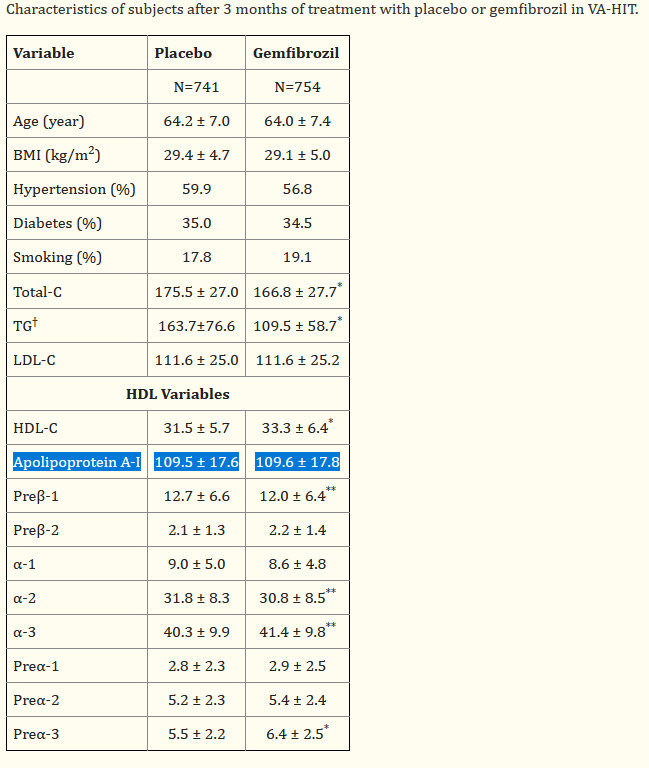May I asked what the benefit part of the rationale is for a temporary dosing is?
The uncertainty, and the mixed opinions whether there is an interaction concerns me, as that is not typical for other drugs I take or want to take, hence I will avoid it as it doesn’t seem to increase apoA1 which I was looking for, for Alzheimer’s.

Bezafibrate? Post must be at least 20 characters
I have not looked at apoA1 increasing drugs or supplement (or even food) space. So I don’t know what to compare it with. Do you know? I wonder if I could get a chemical synthesis of a CETP inhibitor… ![]()
There is one therapy, called lipoprotein apheresis, that involves removing Lp(a) from the blood using IVs.
Discussed a bit more here
And here
This is quite interesting though. A 5 year old S Korean study showing a positive result.
‘For the blood lipid profile, the policosanol 10 mg and 20 mg groups showed significant reductions in total cholesterol (TC) of around 8% (p = 0.029) and 13% (p = 0.0004), respectively, at week 24 compared with week 0. Serum HDL-C level significantly increased up to 16% and 12% in the policosanol 10 mg (p = 0.002) and 20 mg (p = 0.035) group, respectively. The study results suggest that long-term policosanol consumption simultaneously reduces peripheral BP as well as aortic BP accompanied by elevation of HDL-C and % HDL-C in TC in a dose-dependent manner.’
I don’t expect any Lp(a) drug to provide benefits by itself.
That is not convincing to me still since it is only one study.
If other studies fail then it suggest it is not a good supplement.
Not convincing but interesting. The german study i note was for a shorter period than the positive studies
(korean and cuban)
I also found another 2023 study in Japan with a positive result.
“In conclusion, 12 weeks of Cuban policosanolconsumption in Japanese subjects showed significant improvement in blood pressure, lipid profiles, hepatic functions, and HbA1c with enhancement of HDL functionalities”
The other (negative) 2006 study by Dulin et al was only 8 weeks. Same for the 2008 Italian study
Maybe there’s a time issue? Speculatively… Gut microbiome modulation effects often take longer.
Finally… This 2019 systematic review and met analysis of RCTs found a positive result for improvements in blood pressure from policosanol.
This is getting more convincing the longer i look. I’ve got some beeswax/honeycomb honey somewhere - i might just try a n= 1 study.
2.5g of wax = circa 22mg policosanol
That study looks shady to me, lots of measurements at different points (multiple comparisons problem), excluding half of the participants. At week 8 LDL-c was statistically significant but not other weeks…
Which study? The japanese or Korean. Or the meta analysis,?
The study done in Japan, both are Korean studies.
It was “interesting” (according to the authors) that there was an effect at 8 weeks in LDL-c.
How come? It seems to be that the field is very bullish on the new Lp(a) lowering meds
Because while Lp(a) is the worst kind of apoB particle, it only accounts for a low percentage of all apoB particles.
Although a low percentage, it’s apparently enough to cause atherosclerosis. Multiple drug companies wouldn’t be betting millions of dollars if the theory weren’t strong, and it definitely is strong from all the papers I’ve seen.
I think we’re talking about the same study - the one carried out at a Japanese hospital? Fukuoka University Hospital?
"Shady"seems a bit strong. Nothing inherently wrong measuring multiple things every 4 weeks. The low compliance was obviously an issue but i think “shady” suggests dubious integrity. Notwithstanding the small sample size, the results look pretty decent for hba1c, blood pressure and hdl/ldl ratio improvements.
It also gives an interesting insight into a possible reason for the negative 2006 german study : "
At the baseline of the study, however, all the participants (mean age: 56 ± 12 years old, body mass index = 27.2 ± 3.6) were patients with hypercholesterolemia who quit statin 6 weeks ago."
Trying to disentangle the statin termination affect would be a bit messy.
I give a lot of credence to Japanese studies. I would say they are more truthful than those from other countries including the USA.